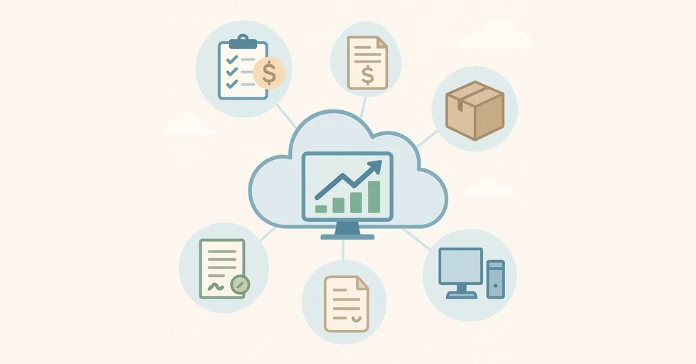Salesforce CPQ has long been the go-to tool for configuring products, pricing deals, and generating quotes. But business needs have evolved, and Salesforce has responded with something much bigger.
Revenue Cloud: a unified platform that manages every stage of the quote-to-cash cycle. It combines sales, finance, and legal processes into a seamless experience that adapts to any pricing model.
Whether you’re using Salesforce CPQ today or evaluating quote-to-cash solutions, this blog is your complete guide to what Revenue Cloud is, why it matters, and how to use it.
Table of Contents
What Is Salesforce Revenue Cloud?
Salesforce Revenue Cloud isn’t just a new product—it’s a strategic shift. It’s built for companies that need more than quoting tools, offering a full-spectrum solution to manage the entire revenue lifecycle.
Salesforce Revenue Cloud is an integrated suite that unifies sales, finance, and operations. It empowers businesses to handle quoting, contracting, billing, and revenue recognition—all within the Salesforce ecosystem.
At its core, Revenue Cloud brings together the following functions: Catalog, CPQ, Contracts, Orders, Assets, and Billing. Layered on top is Agentforce, Salesforce’s AI-powered engine that assists with guided selling, contract creation, and automation across the revenue process.
Key things Revenue Cloud enables:
- Create accurate quotes and manage contracts in one place
- Automate billing, payment collection, and invoicing
- Track customer assets and entitlements post-sale
- Use AI to streamline sales workflows and approvals
Why Salesforce Moved from CPQ to Revenue Cloud
Salesforce CPQ was built for transactions—configuring products and generating quotes. But modern revenue operations demand more: flexibility, automation, and end-to-end visibility.
That’s why Salesforce introduced Revenue Cloud—a platform designed to handle the full revenue lifecycle, not just quoting.
It supports today’s complex needs like:
- Subscription and usage-based pricing
- Omnichannel selling (direct, channel, in-product, e-commerce)
- Contract lifecycle management and compliance
- Real-time billing, fulfillment, and revenue recognition
Revenue Cloud vs. CPQ: What’s the Difference?
| Feature | Salesforce CPQ | Revenue Cloud |
|---|---|---|
| Quotes | ✅ | ✅ |
| Contract Management | 🚫 | ✅ |
| Order Orchestration | 🚫 | ✅ |
| Subscription Management | 🚫 | ✅ |
| Billing and Invoicing | 🚫 | ✅ |
| Multi-channel Revenue Model | 🚫 | ✅ |
CPQ is powerful—but Revenue Cloud is transformational. It extends quoting into billing, fulfillment, and beyond.
Core Components of Revenue Cloud
Salesforce Revenue Cloud is comprised of tightly integrated modules that streamline every stage of the revenue lifecycle. Each component plays a critical role in moving a deal from quote to cash.

| Component | What It Does |
|---|---|
| Catalog | Centralized product and pricing database accessible to all sales channels and teams. |
| CPQ | Configure-Price-Quote engine that uses guided selling and AI agents to help reps generate accurate quotes. |
| Contracts | Full contract lifecycle management, including clause libraries, templates, and AI-assisted redlining. |
| Orders | Orchestrates complex fulfillment processes, breaks down commercial orders, and integrates with downstream systems. |
| Assets | Manages customer entitlements, renewals, upgrades, and product lifecycle after the initial sale. |
| Billing | Unified billing engine that supports one-time, recurring, and usage-based pricing across any channel. |
AI and Agentforce: Smarter Revenue Execution
Revenue Cloud becomes significantly more powerful when combined with Agentforce, Salesforce’s AI-driven digital assistant. Agentforce enhances every step of the sales and revenue process—from guided quoting to contract generation—by embedding intelligence directly into user workflows.
Reps can now create or update quotes instantly using an AI sales agent embedded in the CRM workflow. This speeds up deal cycles, ensures compliance with pricing rules, and reduces manual effort across teams.
With Agentforce, users can:
- Receive AI-powered quote suggestions based on buyer signals
- Generate and edit contracts with pre-approved clauses
- Accelerate redlining with smart clause recommendations
- Auto-initiate review workflows and approval paths
Key Benefits Across the Revenue Lifecycle
a. Sales Acceleration
- Generate faster, more accurate quotes using guided selling tools
- Increase deal size through smart product bundling and upsell suggestions
- Enable seamless quoting across direct, channel, and digital storefronts
b. Finance & Legal Efficiency
- Use templates and AI to automate contract redlining and approvals
- Support complex models like subscription and usage-based billing
- Automate invoicing and streamline credit memo creation
c. Revenue Assurance & Visibility
- Avoid order errors with automated order-to-fulfillment orchestration
- Track obligations and service-level agreements (SLAs) from the CRM
- Gain real-time insights into deal health, revenue recognition, and renewal risk
Features of Salesforce Revenue Cloud: A Unified Revenue Engine
Salesforce Revenue Cloud delivers a full spectrum of features that support every monetization model and channel while keeping the entire quote-to-cash journey tightly connected and intelligent.
1. Monetization Flexibility
Revenue Cloud is built to support dynamic and hybrid revenue models:
- One-time product sales
- Subscription billing (monthly, annual, tiered)
- Usage-based pricing with flexible allowances and metering
- Mixed models combining services, hardware, and digital access
Whether it’s a software license, a physical product, or a pay-as-you-go service—Revenue Cloud adapts seamlessly.
2. Guided Selling and Catalog Intelligence
Quote Generation with Guided Selling
- Guided flows help sellers quote quickly and accurately
- Built-in rules ensure compliance and valid configurations
- AI suggestions prompt relevant upgrades or add-ons
Centralized Product and Pricing Catalog
- One source of truth for all products, tiers, and pricing models
- Supports contract-specific pricing and promotions
- Pricing waterfall simplifies complex pricing structures
3. Contract Lifecycle Management (CLM)
Revenue Cloud manages the entire contract lifecycle natively in Salesforce:
- Create, negotiate, and amend contracts within the CRM
- Use templates and clause libraries for faster generation
- AI-assisted redlining and clause suggestions
- Legal, sales, and finance collaborate in one workflow
4. Order Orchestration and Fulfillment
Complex orders are simplified through flexible orchestration tools:
- Split commercial orders into technical fulfillment tasks
- Configure workflows for delivery, provisioning, or services
- Automate triggers to downstream systems like ERP or logistics
- Monitor dependencies and timelines in real time
5. Billing and Payment Collection
Revenue Cloud eliminates fragmented billing systems with unified billing:
- Generate invoices automatically on any schedule
- Consolidate billing across channels, products, and services
- Accept electronic payments (ACH, credit card, gateways)
- Automate dunning, credit memos, and reconciliation workflows
6. Multi-Channel Selling
Enable seamless transactions across all your revenue channels:
- Direct sales teams
- Partner and channel sellers
- Embedded in-product purchases
- E-commerce portals and self-service platforms
No matter where the transaction begins, Revenue Cloud unifies quote, contract, billing, and fulfillment into one flow.
Who Should Use Salesforce Revenue Cloud?
Salesforce Revenue Cloud is purpose-built for organizations looking to modernize and unify their revenue processes—from quoting to cash collection. If your business is dealing with fragmented systems, manual approvals, or disconnected sales and finance workflows, Revenue Cloud can be the transformation you’re looking for.
Here’s a closer look at who can benefit most:
| Business Type | Why Revenue Cloud Is a Fit | Examples |
|---|---|---|
| B2B Companies with Complex, Configurable Products | Automates quoting for highly configurable products, bundles, and pricing rules. Ensures accuracy and compliance across channels. | Manufacturing, MedTech, Industrial Equipment, Telecom |
| Subscription-Based SaaS or Service Providers | Supports recurring billing, usage-based pricing, and automated renewals with built-in compliance for revenue recognition. | SaaS platforms, IT services, digital content providers |
| Businesses with Disconnected Billing or ERP Systems | Replaces fragmented tools with a unified platform for quoting, billing, and payment. Reduces errors and manual work. | Mid-size to enterprise firms using siloed quoting or legacy billing |
| Salesforce CRM Users Seeking End-to-End Visibility | Adds quoting, contracting, and billing directly into the Salesforce ecosystem for seamless pipeline-to-payment tracking. | Companies using Sales Cloud, Service Cloud, or Experience Cloud |
| Scaling Enterprises Launching New Revenue Models | Supports hybrid monetization models and quick rollout of new offerings without reengineering backend systems. | Global firms, marketplaces, or startups adding usage or bundle pricing |

End Note
Revenue Cloud is more than just an evolution of CPQ—it’s a comprehensive, AI-powered platform designed to manage the entire revenue lifecycle across products, pricing models, sales channels, and business functions.
Whether you’re upgrading from CPQ or exploring a full quote-to-cash transformation, Revenue Cloud gives you the flexibility, automation, and visibility needed to scale your revenue operations confidently.
Need Expert Help?
- If you’re focused on optimizing your CPQ solution, connect with our Salesforce CPQ consulting team.
- If you’re ready for a comprehensive revenue transformation, explore our full Salesforce consulting services.


